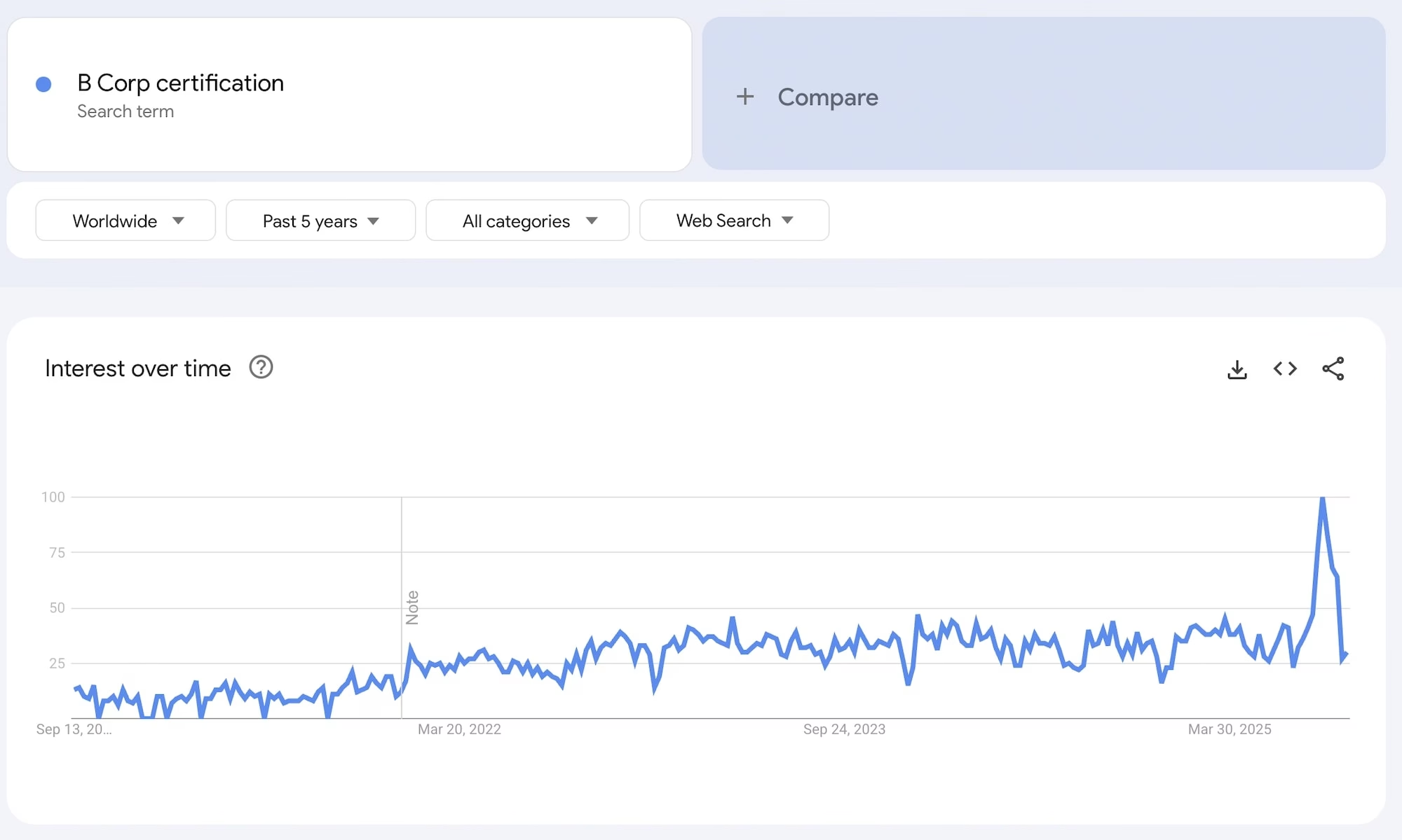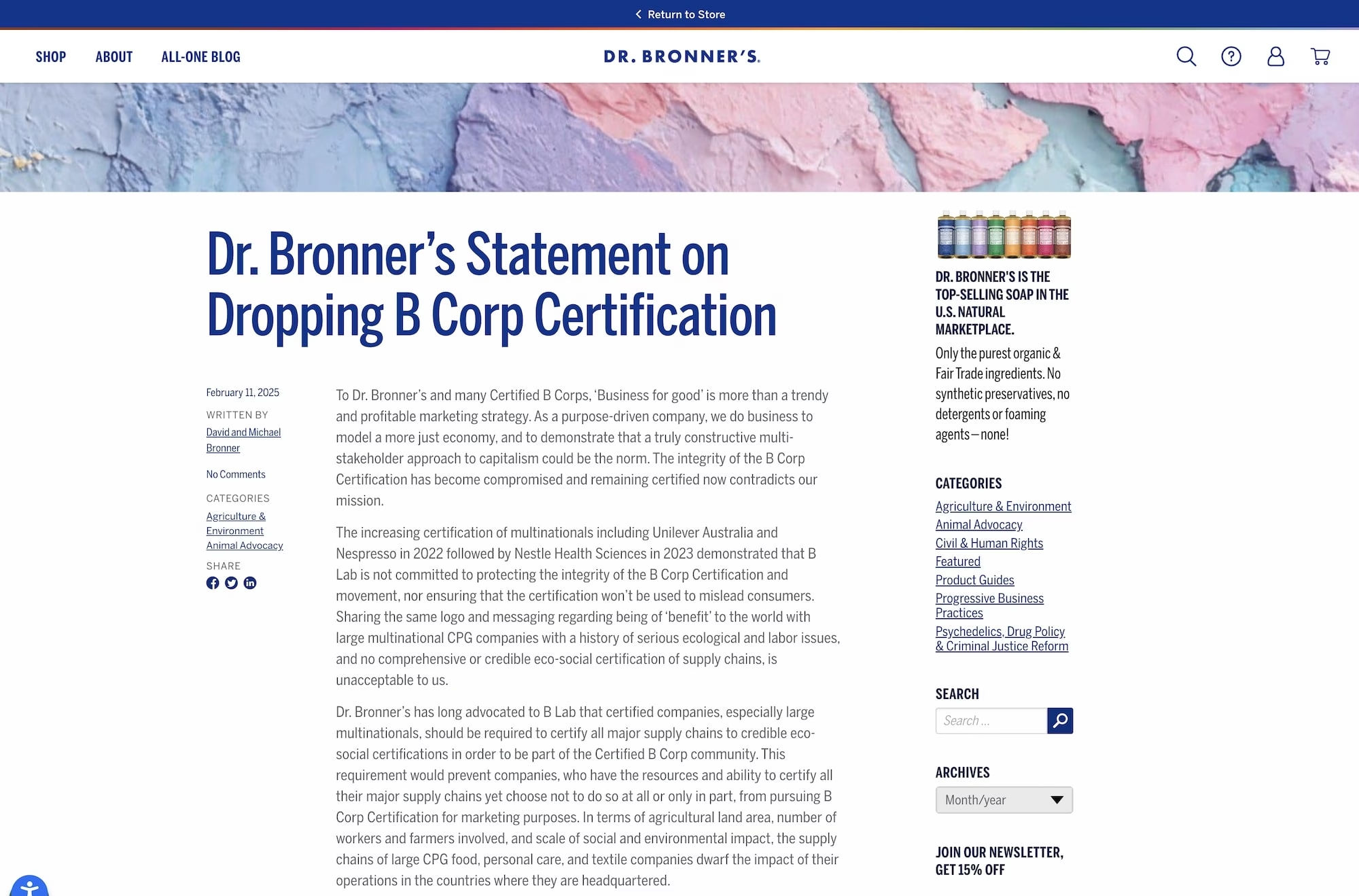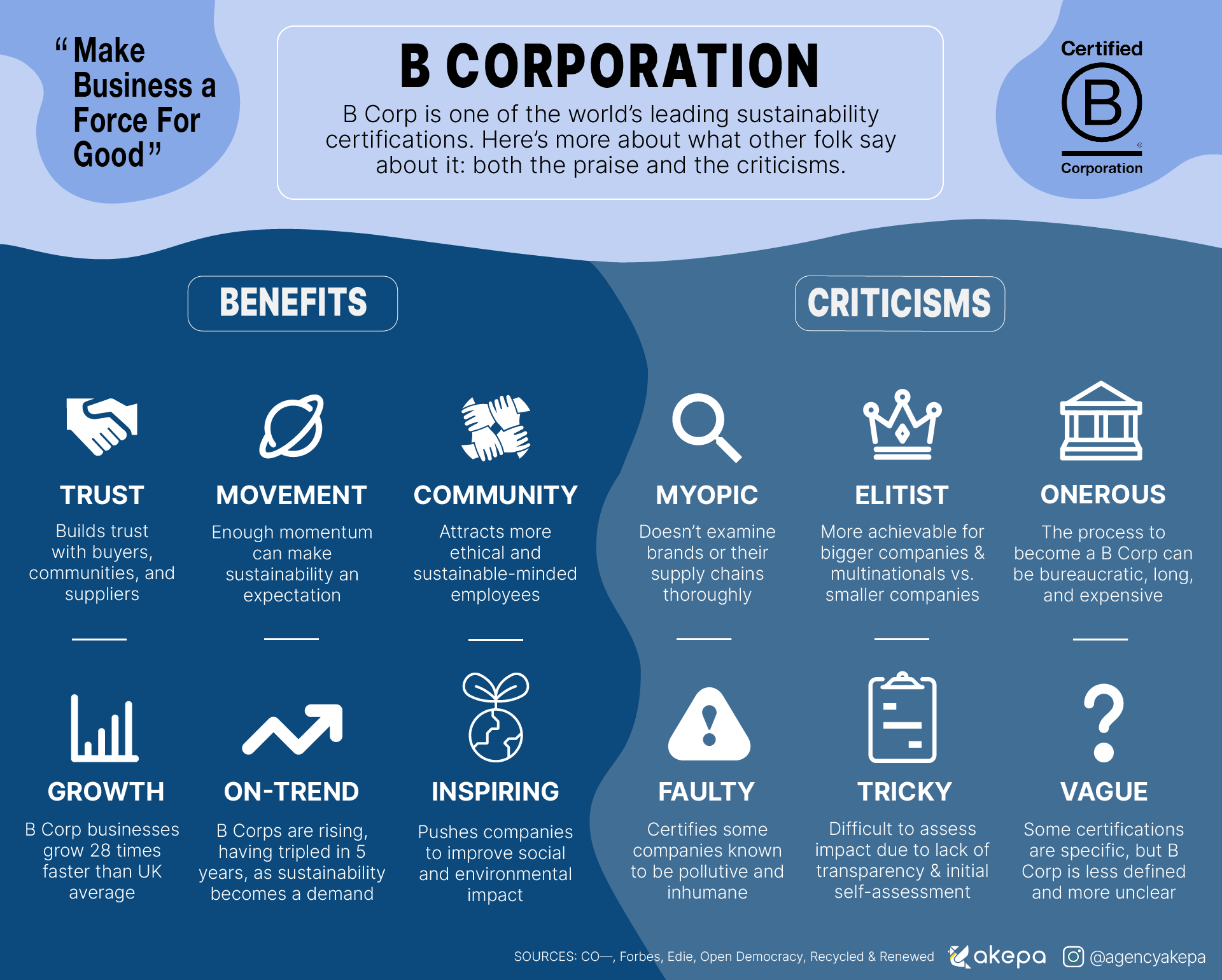B Corp certification is about to evolve.
And the evolutionary stress is the rough ride over the past few years. Once the emblem of sustainability excellence and the certification du jour. Today, it’s looking marginally more haggard.
The certification has lost some of its shine for a number of reasons but the main one is surely certifying multinational companies perceived to be pollutive, like Nespresso, a maker of coffee capsules, and Princess Polly, an Australian ‘fast fashion’ company. As those companies have joined, there has been an exodus of companies renowned for their sustainability excellence, like Dr Bonners – the best scoring B Corp ever. Some of these companies have openly accused B Corp certification of being a marketing badge used for greenwashing, before heading off into the hills and pursuing other paths to demonstrate the good things they’re doing.
Despite this turbulence, B Corp remains one of the top certifications you can attain as a sustainable company. There is nothing quite like it and there’s still relentless demand from companies wishing to become B Corps. But it would be too complacent to believe that things can remain as they are.
Let’s look at what’s coming round the corner in 2026.

Why has B Lab changed the standards?
The transition began on 8 April 2025, when B Lab launched its new standards.
The overhaul isn’t a cosmetic refresh to branding. It’s a response to serious movements in the market. You could say the threats are three-pronged.
- Alleged weaknesses: The old points-based B Impact Assessment – scored across five key ‘Impact Areas’ – allowed companies to negate poor performance in one area by overachieving in another, creating loopholes that critics said rewarded optics over substance. For instance, a company could score poorly on the Environment area but still prevail if they scored well elsewhere.
- Market trust: To remain credible, B Corp has to prove it can stand up to accusations of greenwashing. As mentioned earlier, some of these accusations have come from faraway critics but others have come from B Corps leaving the certification, like Scrumbles. The founder of Scrumbles called the certification “little more than a marketing badge” on Linkedin.
- Regulatory pressure: The EU is strengthening its legal scaffolding around sustainability and this will impact what companies can say. For example, the Empowering Consumers for the Green Transition (ECGT) directive will require companies to back up sustainability claims with hard evidence, from 2026.
The new standards aim to bring some veracity back to the certification and build more belief.
What are the changes?
No more overall score
The old system revolved around scoring at least 80 points on the B Impact Assessment. That’s gone. Instead, companies must now meet foundational “Year 0” requirements to achieve certification, then commit to higher obligations at Year 3 and Year 5.
You must improve over time
Beforehand, companies did not have to improve over time. Soon, businesses must demonstrate measurable progress to be recertified, and show plans for improvement.
This makes the certification less of a box ticking exercise and more about advancement. B Corp is shifting from an indestructible badge to continuous responsibility. Staying still won’t cut it.
Third-party verification
In a major shift, all B Corp assessments will now be conducted by independent third parties. This is designed to comply with EU anti-greenwashing rules and bring more rigor to the process.
For certifiers, this may mean the process becomes longer and more bureaucratic but that’s a small downside to gain a more trustworthy certification.
All impact areas must be addressed
Under the old rules, companies could play to their strengths, scoring high in some of the five areas while kicking others into the long grass. In essence, an à la carte menu. That flexibility is gone. From now on, every B Corp must meet minimum standards across every single one of the seven impact areas:
1. Purpose & Stakeholder Governance
Firms must imbue purpose into governance structures, with accountability to a broad array of stakeholders: workers, communities, customers, the environment, and shareholders. Clear reporting and stakeholder dialogue must back this all up.
2. Fair Work
Jobs must provide decent pay, dignity, and opportunities for growth. Worker perspectives should be represented in decision-making and wellbeing.
3. Justice, Equity, Diversity & Inclusion (JEDI)
Even as DEI faces wider pushback, B Corp’s standards remain resolute in this regard. Companies must cultivate inclusive workplaces and supply chains, support underrepresented groups, and incorporate equity into hiring, advancement, and retention.
4. Human Rights
Businesses are expected to carry out human rights due diligence across operations and value chains, addressing risks with gusto rather than simply meeting the legal baselines.
5. Climate Action
Action plans must be in line with the Paris Agreement’s 1.5°C limit. Large companies are required to set validated science-based targets (no more vague pledges) and publish transparent data on GHG emissions.
6. Environmental Stewardship & Circularity
Firms are expected to cut their footprint within ecological boundaries, pursue circular economy models, and contribute to regenerating natural systems – not just minimise harm. The focus on regeneration alongside simple environmental sustainability is surprisingly deep.
7. Government Affairs & Collective Action
Companies must apply their influence responsibly, advocating for social and environmental progress. Large firms are also required to disclose country-specific tax reports to improve transparency on financial shenanigans.
What are the timelines looking like?
The new standards won’t hit everyone at once but the timelines are pretty clear:
- All new applicants seeking B Corp certification: must certify under the new standards from January 2026.
And for recertifications:
- SMEs recertifying in 2026 get a 12-month extension but must start transitioning to the new standards – with some related paperwork and obligations, like a preparatory self-assessment.
- Large companies recertify under the new standards from 2026.
- All recertifications will be under the new standards from 2027 – regardless of company classification.
Will B Corp certification be perfect, now?
Of course not; no certification is perfect. And while some in the industry have welcomed the changes, others feel they don’t go far enough. One issue appears to be a lack of supply chain transparency with Dr Bonner’s releasing a strong statement about the lack of rigor in that department – even under the new standards.

However, it can’t be denied that the certification will be much improved and is also continually improving. There will be iterations beyond this one where the concerns being addressed over the coming years will be dealt with, too.
B Corp has to be viewed as a continually advancing entity and not a perfect one that sits at the peak of evolution (just like the improvements it now demands of certified companies). Considering that, it’s more a question if B Corp certification is ‘good enough’, ‘needed’ and ‘trustworthy’. Perfect, it ain’t.
Rambly thoughts, overall
The bar for certification has been lifted to a new height that’s harder to just glide over if you know the special maneuvers – with no pressures on time or costs. Reaching an impressive score isn’t enough. Companies must prove continuous progress across all of the new impact areas. And that’s all subject to independent verification.
For businesses that are serious about impact, this is top news: the new standards will separate genuine leaders from opportunistic badge-seekers. For those who treated B Corp as a one-off marketing exercise, the road ahead will be a lot rockier and may even lead to a dead end. Or a figurative cliff that cannot be scaled due to the lack of appropriate equipment.
Either way, the message is clear: from 2026 onward, B Corp should be getting some of its lost credibility back. That’s only going to be a good thing for certifying companies pursuing authentic sustainability.
Can Akepa help my company become a B Corp?
No! That may sound abrupt but it’s simply not a task we can help with.
However, analogous to B Corp status is the task of demonstrating your sustainability through communications. Be it talking about what you’re doing in an engaging way on social media, or being cited for achievements by AI chatbots. We can certainly help with that task. If you’re a B Corp certified company doing good things, or a company still doing good things without the certification, we’d love to have a chat.
If that sounds up your street then get in touch. And if you’re looking at recertifying or becoming a B Corp in 2026 then best of luck with the new standards in 2026.
Here’s a final graphic of the benefits & criticisms of B Corp status, so far:




Leave a Reply